In June of this year, the federal government passed legislation to mark September 30 as the National Day for Truth and Reconciliation. This National commemoration is designated as an opportunity to honour residential school survivors, their families, and communities, as well as acknowledging that the history and legacy of residential schools remains a vital component of the reconciliation process. Last month, UBC’s President and Vice-Chancellor, Santa J. Ono, encouraged all members of the UBC community to honour the National Day for Truth and Reconciliation, whether through personal reflection, education and awareness activities or by participating in Orange Shirt Day!
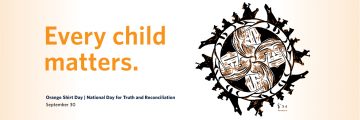
For the last 8 years, September 30 has been observed as Orange Shirt Day, a movement to recognize the colonial legacy of residential schools and commit to the ongoing process of reconciliation. Next Thursday, join us and hundreds of others across Canada to honour the children who survived the Indian Residential Schools and remember those that didn’t by wearing an orange shirt. The Orange Shirt Day project has worked towards the recognition of the harm of the residential school system. It is a symbol to show reverence to residential school survivors, an affirmation of our commitment to ensure that every child around us matters. Orange Shirt Day is an opportunity for people, schools and communities to come together in the spirit of reconciliation and hope for generations of children to come.
Why Orange Shirts?
Orange Shirt Day is a legacy of the St. Joseph Mission residential school commemoration event held in Williams Lake, BC, Canada, in May 2013. It grew out of Phyllis Webstad’s story of having her shiny new orange shirt taken away on her first day of school at residential school. Orange Shirt Day recalls the experience of residential school Survivor Phyllis Webstad, who at six was stripped of her shiny new orange shirt on her first day attending the St. Joseph Mission Residential School. Phyllis Webstad told this story for the first time during the event as an opportunity to remember the atrocious aspects of residential school in the Cariboo. As a result, Cariboo Chilcotin School District No. 27 was chosen by the First Nations Education Steering Committee (FNESC) to pilot curriculum changes reflecting the residential school experience. Every September 30th is a call upon humanity to listen with open hearts to the stories of survivors and their families and to remember the tragic loss of many others. Listen to Phyllis’ story below.
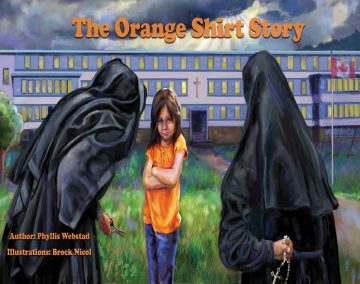
Phyllis Webstad is Northern Secwepemc (Shuswap) from the Stswecem’c Xgat’tem First Nation (Canoe Creek Indian Band). She comes from mixed Secwepemc and Irish/French heritage, she was born in Dog Creek and lives in Williams Lake, BC. Today, Phyllis is married, has one son, a step-son and five grandchildren. She is the Executive Director of the Orange Shirt Society, and tours the country telling her story and raising awareness about the impacts of the residential school system. She has now published two books, the “Orange Shirt Story” and “Phyllis’s Orange Shirt” for younger children.
Why September 30th?
The date was chosen because it is the time of year in which children were taken from their homes to residential schools, and because it is an opportunity to set the stage for anti-racism and anti-bullying policies for the coming school year. It also gives teachers time to plan events that will include the true history of Canada and ensure that schools are passing the Orange shirt story and learning on to the next generations. The organization Orange Shirt Day has created digital resources and supplies to assist with understanding & planning of Orange Shirt Day, it also created digital teacher resources that can be embedded in daily lesson plans. Wearing an orange shirt and promoting the slogan, Every Child Matters is an affirmation of the commitment to raise awareness of the residential school experience and to reflect on our hope for a better future in which all children are empowered. Let’s remember to respect and honour every student on September 30th.
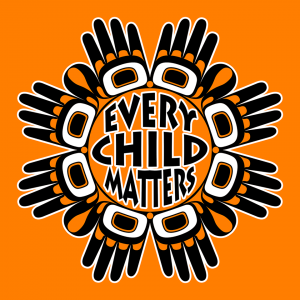
What can you do?
Every Child Matters! Orange Shirt Day is a day for survivors to be reaffirmed that they matter, and so do those that have been affected. The annual remembrance on September 30th opens the door to a global conversation on all aspects of residential schools. The event was designed not only to commemorate the residential school experience, but also to witness and honour the healing journey of the survivors and their families, and to commit to the ongoing process of reconciliation. In addition to the more than 6000 lives lost estimated by the TRC, recent discoveries indicate that the true total is much higher. All Teacher Candidates are invited to participate in creating orange shirts to commemorate each of the Indigenous children who lost their lives at IRSs. The collected contributions will be installed in the Scarfe Building as an ongoing act of remembrance and reconciling.
Contribute by making a tiny orange sweater. Join us in a knitting or crocheting workshop, offered by Dr. Lorrie Miller, Dr. Kerry Renwick, Dr. Shannon Leddy and Heather Clark.
Place: Scarfe 1107 on
Dates: September 28, October 5, and October 12
Time: 12:00 – 3:00 pm.
Who: New and seasoned knitters and crochet enthusiasts are all welcome. Patterns, directions and materials will be available. Yet, we welcome additional donations (below).
Donations of materials or completed shirts can be dropped off at:
Teacher Education Office: 103 – 2125 Main Mall, Neville Scarfe Building | Vancouver, BC
Canada V6T 1Z4 | Unceded Musqueam territory
Monday – Friday 8:30-4:30 pm.
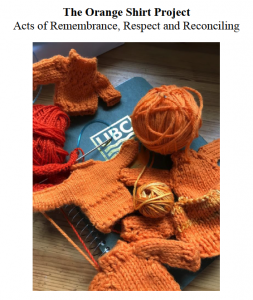
The orange shirt taken from one child, is a symbol of the many losses experienced by thousands of students, and their families and communities, over several generations including loss of family, language, culture, freedom, parenting, self-esteem and worth. It reminds us of the painful experiences of abuse and neglect children suffered. Wearing orange shirts is a symbol of defiance against those things that undermine children’s self-esteem. It is an opportunity to create meaningful discussion about the impact of colonialism and the impacts it created. A discussion all Canadians need to tune into to create bridges towards truth and reconciliation. Post pictures of your orange shirt, the event or activity you attended, share your story, or simply enjoy others sharing theirs. On September 30th we wear orange!
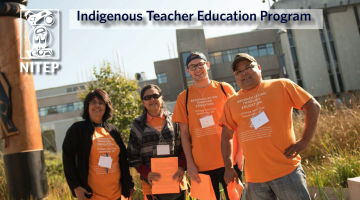
Finally, a beautiful exhibit that tells the story of a residential school survivor is Bea Silver Lexeywa Art Activism. The students of Robert Bateman’s Art Activism initiative at The University of the Fraser Valley invite us to witness their current work which visually narrates the life story of Bea Silver; a prominent Elder, educator, leader and residential school survivor. Lex̱éywa – “Torch” calls us to consider the history and impact of residential schools on a national level, as well as on a local scale, as viewers move through a circular exhibition. 20 large-scale paintings paired with audio recordings relay her story chronologically, uncovering an individual experience that speaks to the lasting impact of residential schools, as well as universal truths, struggles and ultimately, the resilience of one exceptionally strong survivor of this history we all share. Learn more about it below!